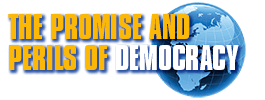What is the future of democratic societies? How do we become more democratic, establish fairer systems, equal access to education, culture, standards of living? How do we achieve participation in democracy itself? What does democracy cost? Over the course of the Spring 2020 semester, “The Promise and Perils of Democracy” series will feature the most powerful activists and visionary minds on these issues. Come join us!
“Reimagining the University,” a panel on March 16, will feature Raewyn Connell, author of The Good University: What Universities Actually Do and Why It’s Time for Radical Change; Leigh Claire La Berge, author of Scandals and Abstraction; and Natasha Warikoo, author of The Diversity Bargain: And Other Dilemmas of Race, Admissions, and Meritocracy at Elite Universities. Stephen Brier, professor of urban education at The Graduate Center and co-author of Austerity Blues: Fighting for the Soul of Public Higher Education. (Presented with the Ph.D. Program in Urban Education.)
Stacey Abrams, former Georgia gubernatorial nominee and former Georgia House Democratic leader, and Johnnetta Betsch Cole, former president of Spelman College, will enter a lunch time conversation on important visions of democracy on April 21. Abrams, author of the recent bestseller Lead from the Outside, launched the organization Fair Fight after the 2018 gubernatorial election to ensure that every voter in Georgia and across the country has a voice in the democratic process. The discussion is the kickoff event of the Coalitional Democracy Conference, which will focus on ways to build coalitions—across lines of race, gender, class, and sexuality—in order to build a more equal society.
Economist Julia Cagé will discuss the “Price of Democracy” on April 30. Professor Cagé will talk about her vision for more representative and democratic governments. Election financing will be the center topic, following her book The Price of Democracy: How Money Shapes Politics and What to Do About It. Looking at attempts to curb the influence of wealth in the U.S. and Europe, Cagé shows that it is possible to design better election systems to increase political participation and trust.
“Artistic Visions of Democracy” on May 13 will be our final event. Cultural change has often been driven by artists imagining a fairer and more democratic world. Often before the rest of the culture is ready, the artist plays a central role in questioning assumptions, visualizing new structures, and picturing a better world to live in. A cross-disciplinary panel explores how the arts are a vital creative laboratory for justice, democracy, and social transformation.
If you won’t be able to join one of our events in person, most of them will be live streamed. Please stay tuned for more information.
